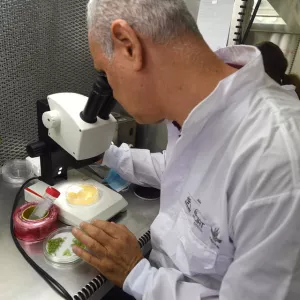In a Scientist’s Words: Why Agriculture Needs Gene Editing
Andrew Wight: So what exactly are these technologies, and how are they different from GMOs? Paul Chavarriga: For gene editing,CRISPR technology allows us to get into a plant genome and change a simple gene to produce a new trait. For example, if you have a plant that’s susceptible to bacterial disease, with a knockout you can make the plant resistant

In a Scientist’s Words: Why Agriculture Needs Gene Editing
Andrew Wight: So what exactly are these technologies, and how are they different from GMOs?
Paul Chavarriga: For gene editing,CRISPR technology allows us to get into a plant genome and change a simple gene to produce a new trait. For example, if you have a plant that’s susceptible to bacterial disease, with a knockout you can make the plant resistant to that particular disease, making it more productive for farmers.
We’re not inventing anything that nature hasn’t already invented; in plant breeding, we speed up the same process of genetic changes that gives you better characteristics in key crops. The outcome is the same as what you’re trying to get through mutagenesis or traditional plant breeding, but it’s more precise, because you know which gene you’re targeting.
At the Alliance, our ears are tuned to identify technologies across the world that allow us to have a positive impact on modern agriculture, and gene editing is a prime example, as this technology allows us to rapidly achieve the precise result we’re looking for, simply by making a small change to the genome. However, we still need to speed up this process, because with increasing food insecurity, we can no longer afford to take 10-20 years to develop new varieties.

